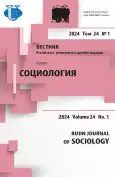Нелинейное влияние эффектов «нормальных травм» на человеческий капитал
- Авторы: Кравченко С.А.1,2
-
Учреждения:
- Московский государственный университет международных отношений
- Институт социологии ФНИСЦ РАН
- Выпуск: Том 24, № 1 (2024)
- Страницы: 217-227
- Раздел: Социологический лекторий
- URL: https://journal-vniispk.ru/2313-2272/article/view/323242
- DOI: https://doi.org/10.22363/2313-2272-2024-24-1-217-227
- EDN: https://elibrary.ru/WUYNFW
- ID: 323242
Цитировать
Полный текст
Аннотация
В статье рассматривается усложнение характера социальных и культурных травм под влиянием становления глобо-локальной сложности и перехода к доминированию нелинейного развития. Один из типов современных сложных травм - «нормальная травма», проявляющаяся в виде «естественно» возникающих флуктуаций, бифуркаций, разрывов, парадоксов и метаморфоз. Последствия «нормальных травм» для человеческого капитала двойственны: с одной стороны, они деформируют существующие ценности и нормы, ранее приобретенные важные компетенции, навыки и знания оказываются невостребованными; с другой стороны, такие травмы способствуют созданию новых качеств человеческого капитала, необходимых для адаптации к сложным, нелинейно развивающимся реалиям. В статье проанализированы «нормальные травмы» человеческого капитала, вызванные процессами глобализации, рационализации, цифровизации и постковидными последствиями. Автор полагает, что «нормальными травмами» можно и нужно управлять, минимизируя и преодолевая их дисфункциональные, дегуманизирующие влияния в интересах формирования новых креативных и гуманистических составляющих человеческого капитала. Для этого предлагается задействовать теоретико-методологический инструментарий гуманистического цифрового поворота, «переоткрыть» значимость субстантивных рациональностей и национально-локальных жизненных миров, внедрить инновационные подходы к формированию человеческого капитала в контексте эффектов глобально-локальной сложности и нелинейности. Необходима национальная стратегия формирования человеческого капитала и национально-культурных ответов на последствия «нормальных травм» с учетом особенностей российской культуры.
Об авторах
Сергей Александрович Кравченко
Московский государственный университет международных отношений; Институт социологии ФНИСЦ РАН
Автор, ответственный за переписку.
Email: sociol7@yandex.ru
доктор философских наук, профессор кафедры социологии Московского государственного института международных отношений (университета) Министерства иностранных дел Российской Федерации; главный научный сотрудник Института социологии Федерального научно-исследовательского социологического центра Российской академии наук
просп. Вернадского, 76, Москва, 119454, Россия; Кржижановского, 24/35-5, Москва, 117218, РоссияСписок литературы
- Agamben G. Homo Sacer: Sovereign Power and Bare Life. Stanford; 1998.
- Alexander J.С. Trauma. A Social Theory. Cambridge; 2012.
- Alexander J.C. The Drama of Social Life. Cambridge; 2017.
- Bauman Z. Collateral Damage: Social Inequalities in a Global Era. Cambridge; 2011.
- Beck U. World at Risk. Cambridge; 2010.
- Beck U. Twenty Observations on a World in Turmoil. Cambridge; 2012.
- Beck U. The Metamorphosis of the World. Cambridge; 2016.
- Becker G.S. Human Capital. New York; 1964.
- Braidotti R. The Posthuman. Cambridge; 2015.
- Castells M. The Information Age: Economy, Society and Culture. Vol. I: The Rise of the Network Society. Oxford; 2010.
- Castells M. et al. Another Economy is Possible. Cambridge; 2017.
- Deleuze G., Guattari F. Anti-Oedipus: Capitalism and Schizophrenia. Minneapolis; 1983.
- Deleuze G., Guattari F. A Thousand Plateaus. Minneapolis; 1987.
- Focault M. The History of Sexuality. Vol. 1. An Introduction. London; 1979.
- Foucault M. The subject and power. H.L. Dreyfus, P. Rabinow. Michel Foucault: Beyond Structuralism and Hermeneutics. Brighton; 1982.
- Foucault M. Governmentality. The Foucault Effect: Studies in Governmentality. Chicago; 1991.
- Giddens A. The Politics of Climate Change. Cambridge; 2009.
- Goffman E. Strategic Interaction. Philadelphia; 1969.
- Gorshkov M.M., Komissarov S.N., Karpukhin O.I. At the Turn of the Century: Social Dynamics of the Russian Culture. Moscow; 2022. (In Russ.).
- Habermas J. The Theory of Relationship between System and Communicative Action. Vol. 2. Lifeworld and System: A Critique of Functional Reason. Boston; 1987.
- Julier A.P. Eating Together. Food, Friendship, and Inequality. Urbana-Chicago-Springfield; 2013.
- Kantorowicz E. Les Deux Corps du Roi. Essai sur la Théologie Politique du Moyen Age. Paris; 1989.
- Kravchenko S.A. The birth of “normal trauma”: The effect of non-linear development. Economics and Sociology. 2020; 2. (In Russ.).
- Kravchenko S.A. Complex risks of covid-19 pandemic: Possible metamorphization of national into cosmopolitan sustainable development. Sustainability. 2021; 13.
- Kravchenko S.A. New transmission mechanism for the sustainable and humanistic development of human capital: Demand for the ‘rigidity turn’. RUDN Journal of Sociology. 2021; 21 (3).
- Lapin N.I. The Complexity of the Formation of a New Russia. An Anthropo-Social-Cultural Approach. Moscow; 2021. (In Russ.).
- Latour B. Reassembling the Social: An Introduction to Actor-Network Theory. Oxford; 2005.
- Merton R. Sociological Ambivalence and Other Essays. New York; 1976.
- Mosco V. Becoming Digital. Toward a Post-Internet Society. Bingley; 2017.
- Prigogine I. The End of Certainty. New York; 1997.
- Ritzer G. The Globalization of Nothing. London; 2004.
- Ritzer G. The McDonaldization of Society. London; 2013.
- Roudometof V. Glocalization. A Critical Introduction. London-New York; 2016.
- Schultz T.W. Human Capital. The International Encyclopedia of the Social Sciences. New York; 1968. Vol. 6.
- Schultz T.W. Investment in Human Capital; The Role of Education and of Research. New York; 1971.
- Schultz T. The value of the ability to deal with disequilibria. Journal of Economic Literature. 1975; 13 (3).
- Schultz T.W. Investing in People. University of California Press; 1981.
- Sorokin P. The Basic Trends of Our Times. Rowman & Littlefield Publishers; 1964.
- Sztompka P. Society in Action: The Theory of Social Becoming. Chicago; 1991.
- Sztompka P. The trauma of social change: A case of post-communist societies. J.C. Alexander, R. Eyerman, G. Bernhard, N.J. Smelser, P. Sztompka. Cultural Trauma and Collective Identity. University of California Press; 2004.
- Toschenko Zh.T. The Society of Trauma: Between Evolution and Revolution (the Experience of Theoretical and Empirical Analysis). Moscow; 2020. (In Russ.).
- Urry J. What is Future? Cambridge; 2016.
- Vanderburg W.H. Our Battle for the Human Spirit. Toronto; 2016.
- Weber M. The Methodology of the Social Sciences. New York; 1949.
Дополнительные файлы









